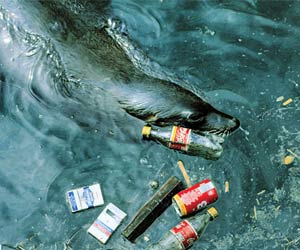
Photo courtesy Katsuhiko Saido
If you thought billions of pounds of indestructible plastic circling the gyres of the ocean was depressing, sorry to say it gets a lot worse. Scientists are now reporting that ” indestructible” plastics decompose with surprising speed and release toxic substances into the water.
The findings were reported today at the 238th National Meeting of the American Chemical Society. Lead researcher Katsuhiko Saido of Nihon University, Japan, and his team found that plastic in the ocean decomposes with exposure to rain, sun, weather, and ocean—giving rise to yet another source of global contamination that will continue far into the future. Their key findings:
- Polystyrene begins to decompose within one year, releasing components that are detectable in the parts-per-million range.
- Decomposing plastic releases potentially toxic bisphenol A, or BPA (the stuff in some plastic bottles and the lining of cans that’s been causing concern), and PS oligomer into the water, causing additional pollution.
- Plastics themselves usually don’t break down in living animal bodies after being eaten. But the substances released from decomposing plastic are absorbed and could have adverse effects. BPA and PS oligomer can disrupt the functioning of hormones in animals and can seriously affect reproductive systems.
- The researchers simulated the breakdown of plastic products at low temperatures found in the oceans. Degrading plastic this way created three new compounds not found in nature: styrene monomer (SM), styrene dimer (SD) and styrene trimer (ST). SM is a known carcinogen and SD and ST are suspected carcinogens.
- BPA ands PS oligomer are not found naturally either and therefore must have been created through the decomposition of the plastic.
Seems to me we need to reconsider what goes into the ocean with the same urgency we’re almost beginning to exhibit towards the atmosphere.













